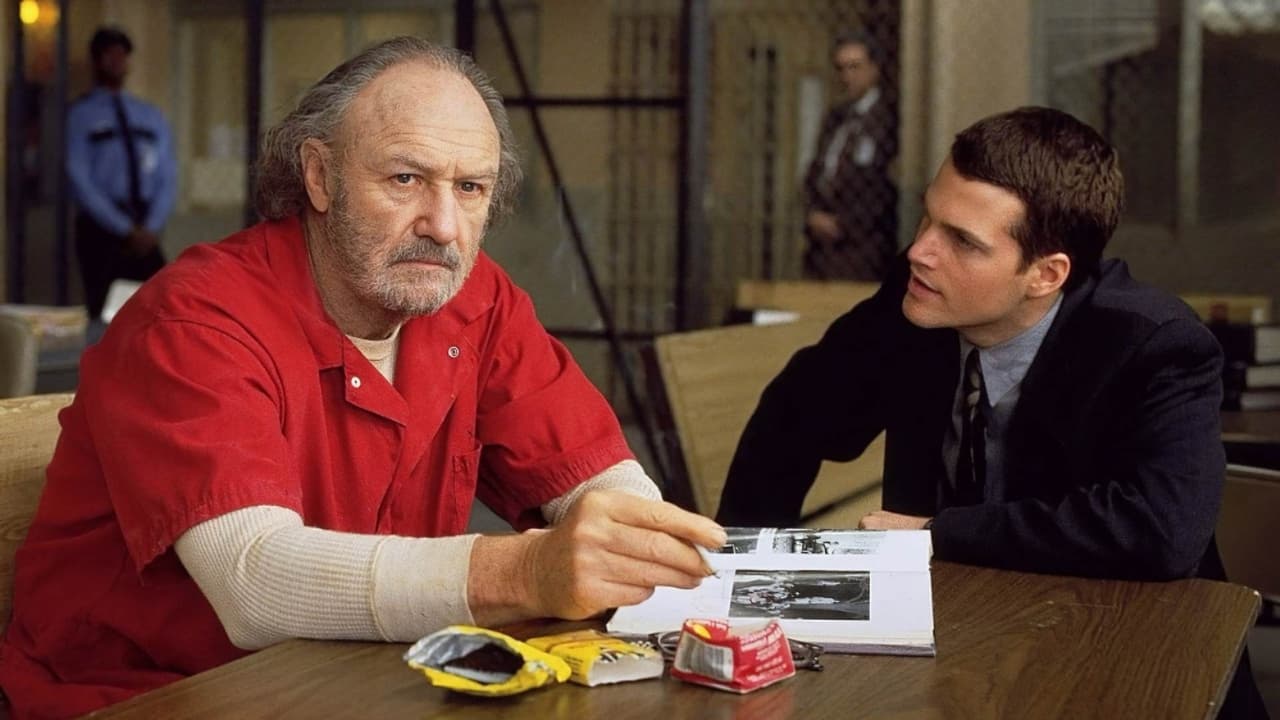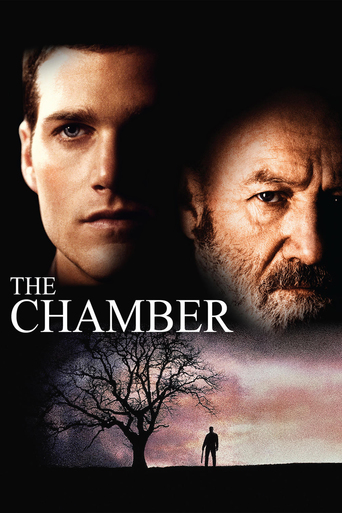

A different way of telling a story
... View MoreThis is ultimately a movie about the very bad things that can happen when we don't address our unease, when we just try to brush it off, whether that's to fit in or to preserve our self-image.
... View MoreIt’s not bad or unwatchable but despite the amplitude of the spectacle, the end result is underwhelming.
... View MoreThe film never slows down or bores, plunging from one harrowing sequence to the next.
... View MoreChris O'Donnell and Gene Hackman star in "The Chamber," a 1996 film featuring Faye Dunaway, Robert Prosky, and Lela Rochon.O'Donnell plays Adam Hall, a young man just out of law school who takes on the case of a KKK member about to be executed for a bombing years earlier that took the life of two boys. Their father, who lost his leg, later committed suicide. The man in question, Sam Cayhall (Hackman), is due to die in the gas chamber, as he was convicted before 1984 and therefore isn't eligible for the chair. He's also Adam's grandfather.The bombing and the Klan history in the Cayhall line has wrecked Adam's family. They changed their name after the incident, and his father committed suicide and left his son a note with instructions to clean everything up before his mother got home. His aunt (Faye Dunaway) is a socialite who still lives in the south and has never told anyone who she is but has suppressed her pain with alcohol. Adam has no use for his grandfather, but he believes someone else made the bomb and wants to find out what really happened.The movie is based on a John Grisham novel and, despite the reviews, I thought it was good and powerful, mostly thanks to the performance of Gene Hackman. Somehow, he manages to create a real human being - a bigot, a Klan member, a killer, but somehow human. His monologue at the end of the film made me cry, which is ridiculous because he was a terrible man.Faye Dunaway was great; Chris O'Donnell is pleasant enough but he never seemed to me movie star material. I would have preferred to see someone like Matthew McConaughey, someone with a little fire, in this role.This is a story of a history of hate, the ghosts of the dead, politics, and a search for closure. Compelling.
... View MoreSchock-free, little suspense and a absolutely horrible performance by Faye Dunaway. This is what this movie has going for it.A grandson fights for his racist grandfather's life. This could have been interesting but we get little to no insight about the back story which led to the event. I will reveal that it has something to do with a murder and the grandfather about to get the gas chamber. I don't think it will spoil anyones enjoyment of the film or vice versa.The problem is that Gene Hackman as the grandfather is such a underwritten character and he is not portrayed enough as the monster he is supposed to be. Yes, he is a white supremacist and his own family resented him for it, but he comes off much too sympathetic as the plot goes along. He yells and resists at first, he mocks his liberal grandson and that's about it.Chris O'Donnell as the grandson doesn't really register either. We know his motivation but we don't really feel his pain of learning where he comes from. Again, the script is severely underwritten on his part.Then the worst of all. The daughter, played by Faye Dunaway. There is a scene at the end between Hackman and Dunaway that is so false, so unintentionally hilarious that I almost shut the film off.The ending is sad but it doesn't have enough emotional power either. Because Hackman has neither been portrayed as a total monster, nor has he been portrayed as monster with a heart, we could care less if he lives or dies.
... View MoreIf you like thrillers set inside the legal systems, the stories by Grisham is one of the best. He is a master of including both small and big twists and turns, writing in layers of secrets that can be revealed along the way. Although, according to the trivia, Grisham says this is one of the adaptations he likes least, I think it still is a very good movie that incorporates these layers and most of the essence in a Grisham story. Of course, the book is much more complex, much more intense, so if you like the movie I can really recommend reading the book.The Chamber is about the young lawyer, Adam Hall, that returns to his family's roots in Mississippi, where one of the family's dark secrets is hidden. His grandfather, Sam Cayhall, is on death row for a fatal bombing carried out by the Klu Klux Klan, scheduled to be executed in just a few days. Adam is his last chance. But Sam is not really cooperative, and even though the bombing was in the sixties, secrets are very much still in play, powerful and dangerous.I think the movie do capture enough of the book to be an intense and suspenseful movie, very much thanks to Gene Hackman's acting. Even though I have seen the movie a couple of times, read the book, I still find it intense. The movie is both durable and stands the test of time. That is the mark of a real good thriller.7/10
... View MoreIdealistic attorney Chris O'Donnell (as Adam Hall) goes down to Mississippi, to take on the "death row clemency case of his onetime Klansman grandfather" Gene Hackman (as Sam Cayhall). "With just 28 days before the execution, Adam sets out to retrace the events leading to the crime for which Sam was convicted. As the impending death sentence looms closer, Adam works quickly to uncover the family's history for any hidden clues. In a white-knuckle series of twists and turns, Adam discovers deceptions and dark secrets that ultimately lead him to the startling truth," according to the DVD sleeve's synopsis."White-knuckled"? Indeed not. "The Chamber" (as in gas chamber) starts off very well; and, Mr. Hackman's portrayal of the yellow-teethed racist is worth a look. Faye Dunaway (as Lee Cayhall Bowman) has a showy supporting role. All in all, the film's personnel portends a much better story than the one which appears on screen. Building up a romance between blue-eyed Mr. O'Donnell and brown-skinned Lela Rochon (as Nora Stark) seems like such an obvious way to improve the story (whether or not it was done in the John Grisham novel), you've got to wonder how on Earth they missed the obvious.***** The Chamber (10/11/96) James Foley ~ Chris O'Donnell, Gene Hackman, Faye Dunaway
... View More